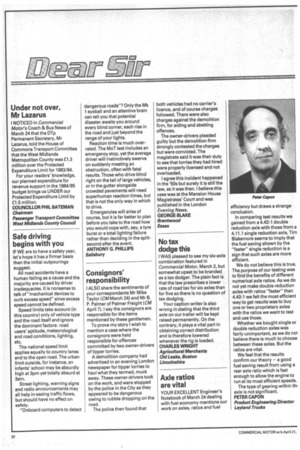Safe driving begins with you
Page 22

If you've noticed an error in this article please click here to report it so we can fix it.
IF WE are to have a safety year, let's hope it has a firmer basis than the initial outpourings suggest.
All road accidents have a human failing as a cause and the majority are caused by driver inadequacies. It is nonsense to talk of "mechanical devices to curb excess speed" since excess speed cannot be defined.
Speed limits take account (in this country) only of vehicle type and the road itself and ignore the dominant factors: road users' aptitude, meteorological and road conditions, lighting, etc.
The national speed limit applies equally to country lanes and to the open road. The urban limit outside, for instance, an infants' school may be absurdly high at 3pm yet totally absurd at 3am.
Street lighting, warning signs and radio announcements may all help in easing traffic flows, but should have no effect on safety.
"Onboard computers to detect dangerous roads"? Only the Mk 1 eyeball and an attentive brain can tell you that potential disaster awaits you around every blind corner, each rise in the road and just beyond the range of your lights.
Reaction time is much overrated. The MoT test includes an emergency stop, yet the average driver will instinctively swerve on suddenly meeting an obstruction, often with fatal results. Those who drive blind right on the tail of large vehicles, or in the gutter alongside crowded pavements will need superhuman reaction times, but that is not the only way in which to drive.
Emergencies will arise of course, but it is far better to plan before you take to the road how you would cope with, say, a tyre burst or a total lighting failure rather than deciding in the splitsecond after the event. ANTHONY G. PHILLIPS Salisbury




















































































